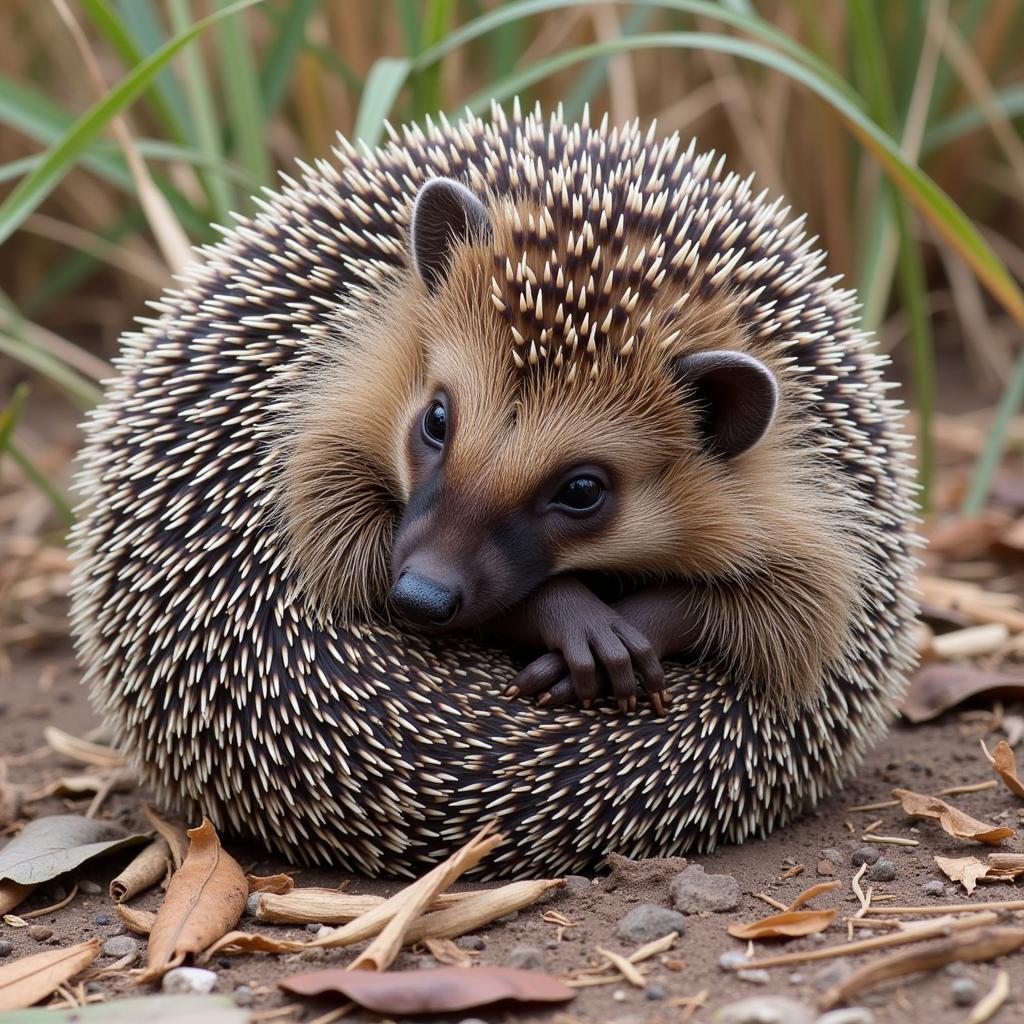The Enchanting World of the African Hedgehog
The African Hedgehog, a captivating creature of the African continent, has become an increasingly popular exotic pet. But there’s much more to these spiky insectivores than meets the eye. From their unique adaptations to their diverse dietary needs, let’s delve into the fascinating world of the African hedgehog.
Unveiling the Secrets of the African Hedgehog
These small mammals, often mistaken for their European counterparts, are distinct in their behaviors and needs. Unlike European hedgehogs, which hibernate, African hedgehogs remain active year-round, reflecting their adaptation to the warmer climates of their native lands. They are primarily nocturnal, spending their days nestled in burrows or hidden amongst vegetation. african hedgehog adaptations Their distinctive quills, a modified form of hair, serve as their primary defense mechanism against predators. When threatened, they curl into a tight ball, presenting a formidable barrier of sharp spines.
 African Hedgehog Defense Mechanism
African Hedgehog Defense Mechanism
African Hedgehog Care: A Comprehensive Guide
Considering an African hedgehog as a pet? african hedgehog pet It’s crucial to understand their specific needs to ensure their well-being. These unique animals require a carefully controlled environment, including a consistent temperature range and a spacious enclosure. A balanced diet is essential, consisting primarily of insects supplemented with high-quality cat food. Providing a stimulating environment with enrichment activities, such as wheels for exercise and toys for exploration, is vital for their physical and mental health.
Housing Your African Hedgehog
A suitable enclosure for an African hedgehog should be large enough to allow for ample movement and exploration. A solid-bottomed cage is preferable to wire, as their small feet can become trapped. Provide a hiding place, such as a small house or tunnel, where they can feel secure and retreat during the day.
 African Hedgehog Ideal Habitat
African Hedgehog Ideal Habitat
Feeding Your African Hedgehog
A healthy african hedgehog diet consists mainly of insects, such as crickets, mealworms, and waxworms. These should be gut-loaded, meaning they are fed nutritious food before being offered to the hedgehog. Supplement their insect diet with a small amount of high-quality cat food, ensuring it is low in fat and high in protein. Fresh water should always be available.
Interesting African Hedgehog Facts
Did you know that African hedgehogs are surprisingly vocal creatures? They communicate through a range of sounds, from snuffles and grunts to hisses and clicks. african hedgehog facts They are also known for their peculiar habit of self-anointing, where they cover themselves in saliva after encountering new scents. This behavior, while not fully understood, is believed to be related to scent marking or parasite control.
Are African Hedgehogs Good Pets?
African hedgehogs can make wonderful companions for those willing to dedicate the time and effort required to meet their unique needs. They are fascinating creatures with distinct personalities, offering a rewarding experience for the responsible owner.
 African Hedgehog Personality
African Hedgehog Personality
Finding an African Hedgehog
If you’re considering adding an African hedgehog to your family, ensure you research reputable breeders or rescue organizations. african hedgehog for sale Avoid purchasing from pet stores, as the animals may not have received proper care.
Conclusion: The Allure of the African Hedgehog
The African hedgehog, with its captivating quirks and unique charm, continues to fascinate animal lovers worldwide. Understanding their specific needs and providing a nurturing environment is key to enjoying the rewarding experience of sharing your life with these intriguing creatures. By respecting their natural instincts and providing proper care, you can ensure a long, healthy, and enriching life for your African hedgehog.
FAQ
- What do African hedgehogs eat? Primarily insects, supplemented with high-quality cat food.
- Do African hedgehogs hibernate? No, they remain active year-round.
- How long do African hedgehogs live? Typically 5-7 years in captivity.
- Are African hedgehogs nocturnal? Yes, they are most active at night.
- What kind of housing do African hedgehogs need? A spacious, solid-bottomed enclosure with a hiding place.
- How do I find a reputable African hedgehog breeder? Research breeders online and check reviews.
- Can African hedgehogs be housed together? No, they are solitary animals and should be housed individually.
Common Scenarios and Questions:
- My hedgehog isn’t eating. Check the food’s freshness and temperature. Ensure a variety of insects and consult a veterinarian if the problem persists.
- My hedgehog is lethargic. Monitor the temperature and humidity of the enclosure. Lethargy can be a sign of illness, so consult a vet.
- My hedgehog is quilling excessively. Quilling is normal, but excessive quilling can indicate stress or health issues. Consult a vet.
Further Exploration:
For more information on hedgehog care, consider exploring resources on hedgehog nutrition, housing, and enrichment.
Need Help?
For assistance with your African hedgehog, contact us at Phone Number: +255768904061, Email: kaka.mag@gmail.com or visit us at Mbarali DC Mawindi, Kangaga, Tanzania. We have a 24/7 customer service team.
